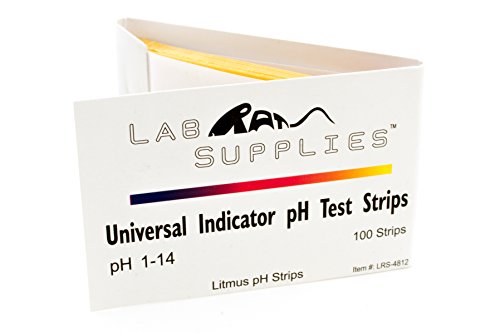All Categories








Litmus Test Paper pH Test Strips, Universal Application (pH 1-14), 200 Testing Strips | for Saliva, Soap, Urine, Food, Liquids, Water with Soil Testing, and Lab Monitoring
Share Tweet
*Price and Stocks may change without prior notice
*Packaging of actual item may differ from photo shown
- Electrical items MAY be 110 volts.
- 7 Day Return Policy
- All products are genuine and original








About Litmus Test Paper PH Test Strips, Universal
This product contains two packs of 100 pH strips, 200 strips in total. Each strip is made of premium grade litmus paper intended for universal application. To test the pH of a solution simply dip the pH strip into your solution and the strip will change color. Quickly match this color against the color chart provided to obtain your solutions pH. Please see our infographic or scroll down for a list of common uses and examples of pH. To further the reliability of our products we randomly test each shipment we receive across multiple pHs to ensure product quality. Instructions: 1. Take one strip from the pack and dip it into the solution you would like to measure. The color of your strip will change immediately. 2. Quickly match this color against the color chart on the inside of your pack to obtain the pH. Do not wait or let the strip dry! 3. The number next to the color on the chart is your pH. The pH scale ranges from 1 (very acidic) to 14 (very basic), 7 is neutral. Please note that solutions with a pH of ~5.5 will result in a yellow colored test strip that resembles the original color of the dry strip. Store in a cool, dry place away from sunlight. Common Uses and Examples of pH Acid Rain, pH = 4.3 – 5.6 Ammonia Based Glass Cleaner, pH = 10 Battery Acid, pH = 1 Beer, pH = 4.5 Bleach, pH = 12.6 Drain Cleaner, pH = 14 Drinking Water, pH = 6.5 - 8.5 Fruit Juice, pH = 2 - 5.5 Gastric Acid, pH = 1.5 - 3.5 Lemon Juice, pH = 2 Milk, pH = 6.8 Milk of Magnesia, pH = 10.5 Oven Cleaner, pH = 13 Pure Water, pH = 7 Saliva, pH = 6.2 – 7.4 Sea Water, pH = 8 Soft Drinks, pH = 2 - 4 Soap, pH = 7 - 10 Tea, pH = 4.9 – 7.2 Urine, pH = 4.6 – 8 Vinegar, pH = 3.1




















